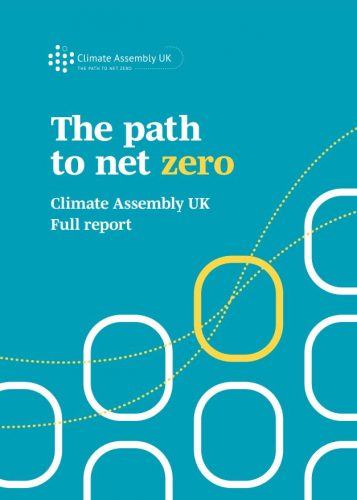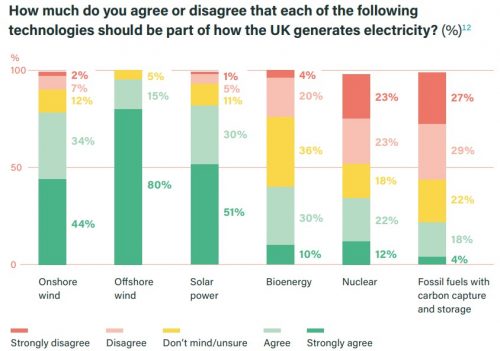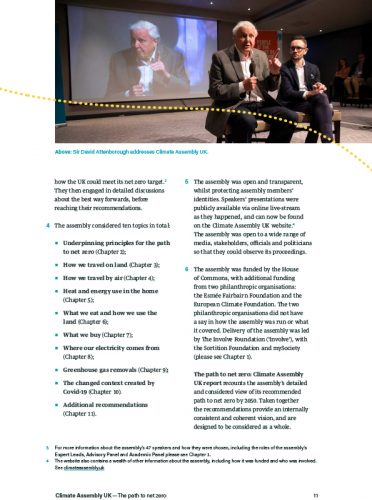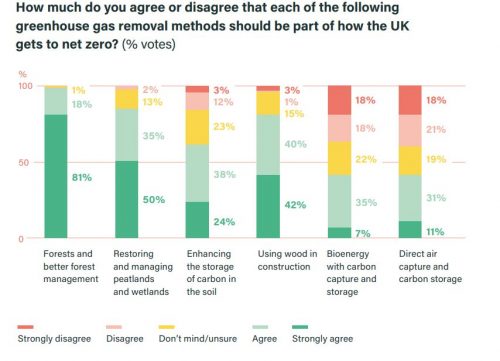The House of Commons commissioned the citizens’ assembly where today they released the first UK Climate Assembly report – it outlines how the UK people feel, as a whole, the country should meet the target of net zero greenhouse gas emissions by 2050 and take climate action.
The Climate Assembly is made up of 108 UK citizens from all backgrounds and opinions and met over six weekends heard unbiased evidence on climate change, including presentations from 47 speakers such as Sir David Attenborough, and the choices the UK has about meeting the 2050 target.
After developed discussions on the matters, the Assembly compiled a detailed report, released on 10th September 2020, and launched by Darren Jones MP, Chair of the Business, Energy and Industrial Strategy Select Committee.

As expected, strong leadership and governance were stated and the importance of cross-party consensus on the plans and targets – which would allow new governments year-on-year to work towards the common goal, verses setting new policy every term.
“Assembly members agree that the task of reaching net zero is a responsibility shared by all generations and we thank them for doing just that, giving up their time to listen, understand, debate and propose solutions which are underpinned by a desire to be fair to everyone.”
– Chair of the Business, Energy and Industrial Strategy Select Committee, Darren Jones MP
The report gives a balance of trade-offs and benefits of solutions, and focus on ten key areas including travel, diet and land use, energy in the home, as well as production of electricity and how we remove greenhouse gasses.
So, how did the views on energy fare?
We know that renewable energy and non-fossil fuel technologies such as nuclear energy, will be central to the continued future of power production in the UK, and the globe, to meet net zero goals, but how did the people of the UK see the different solutions faring, and did they really want to end fossil burning fuels, or were they pro biomass?

“Really striking results from the assembly members”
– On the energy generation in the UK by the members
The report highlights the views that we should generate more power from wind and solar, citing burning wood in power stations (biomass) and use of nuclear were less favourable.
A majority in the assembly agreed that we should be generating our electricity from ‘proven, clean and low cost’ sources:
Offshore wind
95% agreed
Solar power
81% agreed
Onshore wind
78% agreed

We noticed hydro wasn’t in the mix, with the report citing, ‘Assembly members did not hear detailed evidence about tidal, wave, hydro and geothermal technologies. However, assembly members were in principle supportive of the use of these final four ways of generating electricity, particularly for suitable local area.’
With this in mind, why wasn’t hydro deliberated more? Time was cited as a reason to reduce the technologies being presented limited to 6. Likewise, there’s strong evidence about the success of geothermal technology, yet not deliberated more, due to time constraints. Were methods presented to the assemble the ones favoured by Government? Was it truly biased in the presentation and education of the technologies? What would evolve if more times was given on all methods of energy production?
Interesting to note, offshore wind support was high as it was seen as ‘out of the way’. They also commented on the importance of electricity storage to utilise energy production to the fullest.
Nuclear didn’t fair very well, with many members citing it alongside fossil fuels and biomass as the least desirable. In fact although 34% said they thought it should be part of the net zero energy mix, a great percentage 64 % said they disagreed about its use, with near half strongly disagreeing (46%). The members also cited the costs, storage of fuel and spent fuel and the decommissioning of nuclear as reasons for low support in its future.
Over a quarter strongly disagreeing that bioenergy (such as burning wood in plants) production should feature as a solution to net zero energy.
What about fossil fuels, carbon capture and GHG removal?
Fossil fuels, as expected, fared poorly with the assembly – 78% disagreeing on its use in the future of net zero combined with carbon capture technologies, and only a mear 22% showing confidence in the future of this energy source.
‘…leaks from carbon storage sites and a feeling that they failed to address the problem’ were key issues around the use of carbon capture, as they also continued our reliance on fossil fuels as a result.
Other GHG removals such as direct air carbon capture did not fare well either – again citing the storage and effectiveness of the technologies again. The assembly favoured forests, and better forest management as a solution (99% agreed) and enhancing the storage of carbon in the soil (62% agreed) as they were seen as more natural and more beneficial.
In the online launch event of the report, the question was posed to an assembly member that if they had more time to deliberate, what would they want more information on – carbon capture being top on the list with them stating they’d ‘want more time on it to make a more informed decision’ on the technology.
And 92% supported that any solution to emissions should not be outsourced/sent to ‘elsewhere in the world’.

Parliament’s next steps to act
The assembly supported overwhelmingly (95%) that net zero transition should be a cross-political issue and not a partisan one. With goals focused in the long-term plans for net zero agreed by all parties, and interestingly the relationship between ‘big energy companies’ and the government should be more transparent (94% support).
“The move to a net zero economy effects every single one of us”
– Alok Sharma, Secretary of State for Business, Energy and Industrial Strategy (BEIS)
Alok Sharma continued to state that it has found 62% of emission reduction is related to some form of behaviour change. And how that parliament will look at the recommendations in detail to look at how we can fairly implement suggestions across all the policy areas, so we can work together to reach net zero.
The state of net zero
79% of the assembly supported the idea of an economic recovery post Covid19 be aimed to helping achieve net zero
One of the final recommendations of the assembly was incentives to progress to net zero, and conditions on organisations that seek financial support (91% support). It will be interesting to see if the likes of the green home grants announced in the summer C19 budget by the chancellor has any business version in the future to make an organisation’s site energy efficient.
A question posed by one of our team as we reviewed the report, ‘When will there be a Secretary of State solely focused on UK Net Zero who heads up the current abundant of secretaries focusing just on their niche?’.
The growth of green energy production, with a focus on solar, wind, and hydro, is pivotal in our use of energy in the UK. Support of CPPAs in both public and private sector is growing, and this also helps boost our green economy through new training, education and jobs.
“The people have spoken and outlined intent for business, communities, and importantly leadership in Government to meet net zero 2050. Now is the time to take the momentum of working for a common goal, like we have done to tackle Covid19, and push forward for climate change. We have the tools, we have the desire – as an industry we need to move forward with green energy, energy optimisation and energy behavioural change training to achieve net zero.”
Anthony Mayall, CCO, BiU







